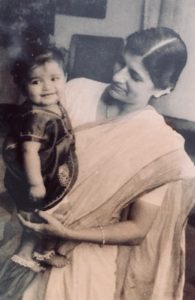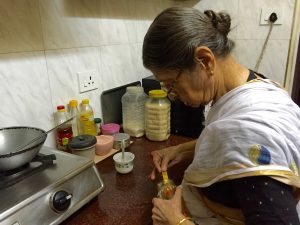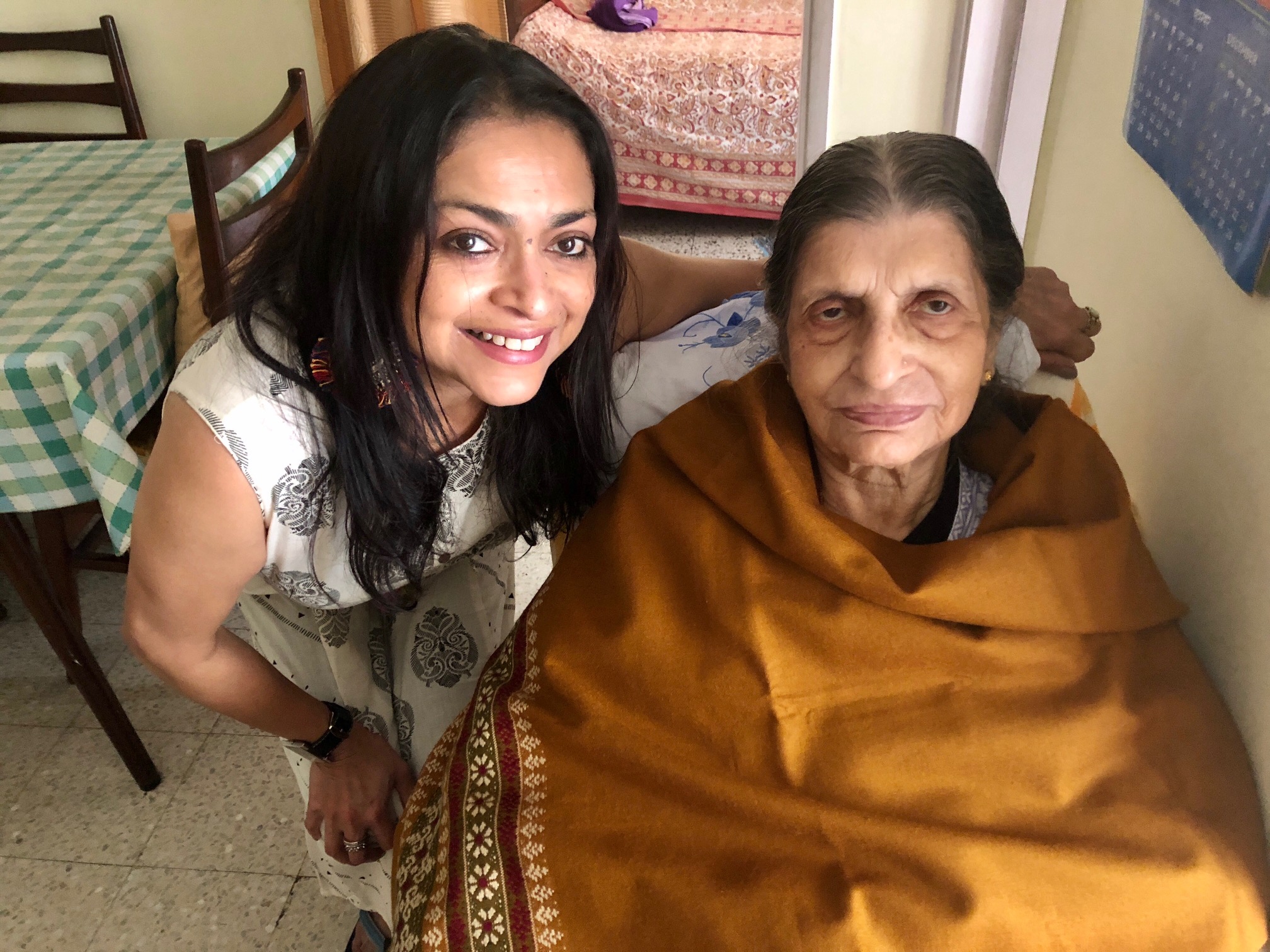On the 24th day of my pandemic isolation, I learned my Pishi, my auntie, had died in her home in Kolkata. The news was not wholly unexpected – she had been ill and suffering for many months. But nonetheless, a dread bore down on me so hard that it made me wonder if I had contracted the virus. How would I ever go home to Kolkata again without her there? She had been my main reason for journeying back to India in recent years. The thought that I would never see her again was crushing.
As a child, I spent many years living in my grandfather’s house. An extended family system was common in India; for sons to remain with their parents even after they had started their own families. The notion of living under one roof with grandparents, uncles, aunts and cousins feels somewhat overbearing now, but back then, I relished the attention showered upon me. I was closest to my father’s younger sister, my Pishi.

She had married and moved to Patna but returned home after her husband contracted meningitis and died way before his time. I was oblivious to the sorrow in Pishi’s life until many years later, when she was able to speak of those days without tears. She had kept the letters her husband had written to her long ago, each in an envelope of its own and stored them carefully in the bowels of one of her bedroom armoires. Things, especially paper, can easily disintegrate in the Kolkata’s harsh heat and humidity. So many of my own parents’ treasures were lost in this way. But Pishi had taken care to preserve what was most precious to her.
I am ashamed to say that I grew up oblivious to the things that mattered in Pishi’s life. Somehow, even when I had begun a career, married and carved out a life of my own, when I returned to Pishi’s house in Kolkata, I reverted back to being Pishi’s little “bhaiji,” or niece, as though I had not grown, as though memories were present day.
“What do you want to eat, Chum? she asked, calling me by an endearing version of my nickname. “What shall I make for you? Where shall we go today?”
She stood at the ready with my favorite Bengali dishes: Kochu Shak (taro stem) and Patishapte made with kheer (sort of like a crepe). I’m not even sure how to describe these delectable dishes in English to give them justice. My cousin Bideesha loves Malpua (a syrupy pancake) and Pishi would make them for her, no matter what time of day or night. Pishi never had a big kitchen – it was hard for even two people to navigate the narrow galley. She didn’t have real china or fancy tableware. None of that mattered. She took meticulous care to prepare food for me.
But it wasn’t about how tasty everything was. Rather, it was an act of salvation. She could have served mediocrity and I would have relished every mouthful. She was a vital link to all that I cherished of home.
For a while, when Pishi was in her youthful 80s, we made it a ritual to go out for masala dosa (a savory potato-stuffed crepe). Pishi and I strolled to a small South Indian café, Vatika, near her flat on Lakeview Road. We sat by the window, watching the heat rise from the freshly washed pavement, sipped our lukewarm Limcas and basked in nostalgia. She had seen me from the day my parents adopted me, a fact from which I drew immense comfort. It was something that was sorely missing from my life in America and I soaked up the stories she told me of my childhood.
In my younger years, I saw Pishi as invincible. She was Wonder Woman. Smart. Beautiful. Compassionate. Stylish. Fun. And most of all, for me, empowering.
I followed her to Sharoda Ashram, the Bengali-medium school for girls, where she taught for many years. I knew all her friends and often accompanied her on her outings. Pishi took me walking by the lakes and we fed breadcrumbs to the carp and koi. On weekends we went to the horticultural gardens, and to the zoo, where I famously tucked my face in the folds of her sari when the hippopotamus spread its jaws and came roaring out of the water. This was a story Pishi liked to tell, even to strangers, even when I was well into my years, much to my chagrin. I reflect on it now and believe she took great pride in being my protector — which she was.
She took me shopping to Gariahat and bought me all the things my father disapproved of: pointy shoes, liquid kum kum (the embellishment on Indian women’s foreheads) and street food. Most notably freshly fried

samosas or phuchkas (puffed bread pockets stuffed with fiery hot potatoes and then drenched in cumin water). We reveled in our act of rebellion. “Don’t tell Baba,” she admonished me.
And on Thursday evenings, I sat quietly with her in the mezzanine worship room while she performed Lakshmi (the goddess of wealth and purity) puja. I listened to her chant mantras in Sanskrit, not understanding a word but comforted by her lilting voice.
I spent countless hours cooking with her and my great aunt, who, too, was widowed at a young age, in the ground floor kitchen or the courtyard, where, unhappily, it
was my task to fan the coals. And at night, I often tucked myself into Pishi’s bed, closing the edges of the mosquito net tight around us. Just me and Pishi. She read me stories from the Bengali children’s book Thakumar Jhuli or we talked and talked until we fell asleep to the heady smell of jasmine, oblivious to the power cut and the sweltering heat. The next morning, it was Pishi who got me ready for school, braiding my hair and tying it with red ribbons.
I followed Pishi around the house so closely that my grandfather joked I was stuck to her for life; that I would never be able to separate from her. I so wished it to be true.
In 1975, my family settled in the United States and I saw Pishi less, though every time I went home to visit, I stayed with her. She had a larger presence in my life again after my mother suffered a massive stroke and my parents moved back to Kolkata. For many years, I returned to India at least once a year, sometimes, two or three times. And every time, I could not wait to see Pishi.

After my own mother died, almost 20 years ago, my bond with Pishi grew even stronger. She was a woman of simple means and yet, she wrote me letters and even called once in a while. And I when I returned to Kolkata, not a day went by without a trip to Flat 3D in Ananda. Our conversations took on seriousness and a strange urgency, as though we both knew time would slip away before either one of us had unburdened ourselves.
We spoke of her premature widowhood and of a relationship she had with a man who was still married. She was scorned for carrying on in such a manner in a society that was, at that time, far more socially conservative. But I knew that she loved him and that she had, for the first time in many years, felt joy. I do believe her heart broke when he left Kolkata to return to his family. Pishi soldiered on, never letting the outside world know of her grief. It took a long time for the void to be less stinging.
And it took a long time before we spoke of the dark moments in her life. I had hoped to have so many more conversations; there remained so many unanswered questions. Now, I never will. That is my regret.
But I do know this: Even though she had her share of loss and sorrow, she never unburdened herself on others. I admired her strength in the face of adversity. I admired her independence and will to live as she pleased. I admired her selflessness. I think of my childhood and what I used to say to Pishi: “I want to be just like you one day.”
Somehow, I hope Pishi knows I am working on it.


Moni , Today’s meeting on Zoom remembering Meenadi was very well done. Am glad you talked about her life before 1959. I remember her in New Alipore in 1957/58 with her husband Tarunda Babu , he too was Good looking a little on the heavy side and they were so happy. As a Ten year old I remember her unpacking her suitcase, she had matching saree blouse sets for Morning and evening. They went to see Cricket Match with Mukulda at Eden Gardens. She was beautiful till the end , even when I met her in February she looked like a marble statue. Later , the shock of her life , should sit at the table with tears rolling down her cheeks, it was very hard. Much later as it so happened my in-laws were in Patna and she asked me about families that she knew and they remembered her. We did talk about Jamaibabu also. She never talked about her Companion later , though we knew but I always felt love deserted her too soon. However she was a very strong person and her life and how she dealt with is something we can all draw examples from. Just one favor , when you go through old photographs, look for Sadhanda’s Wedding day with Topor and all and on each side Meenadi and my Mom dressed to kill . Thought I would share this with you. Take care and rest you had an emotional meeting today.You email me when you feel like it. All the best ChandraPishi
Moni what you have written is incredible!
Remember catching up with Pishi often ,since childhood ,both in Newalipore and Southern Avenue
You made me cry. So well written and from the heart. All I can offer you is a big hug from me to you.
Such a beautiful remembrance of your dear auntie.